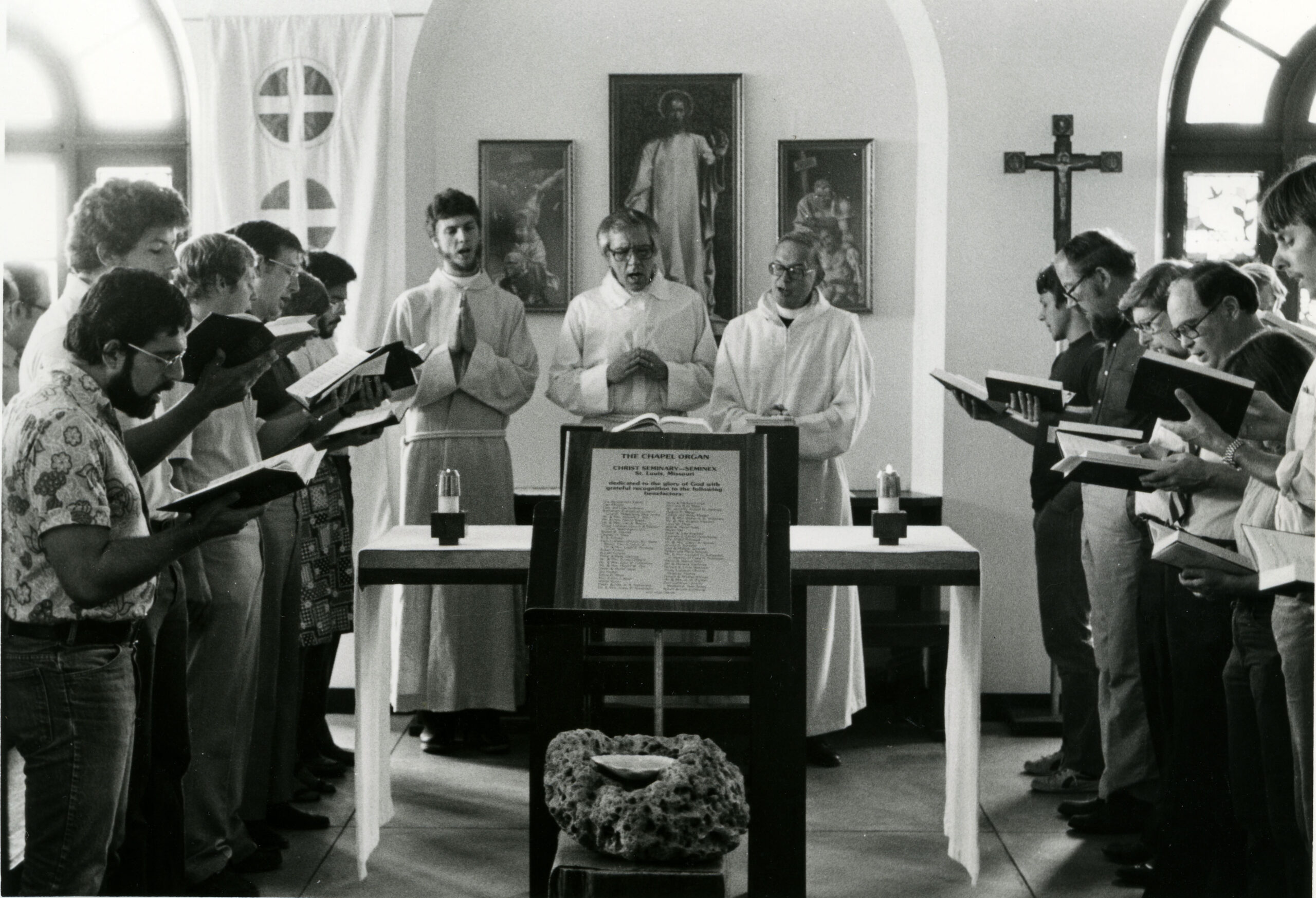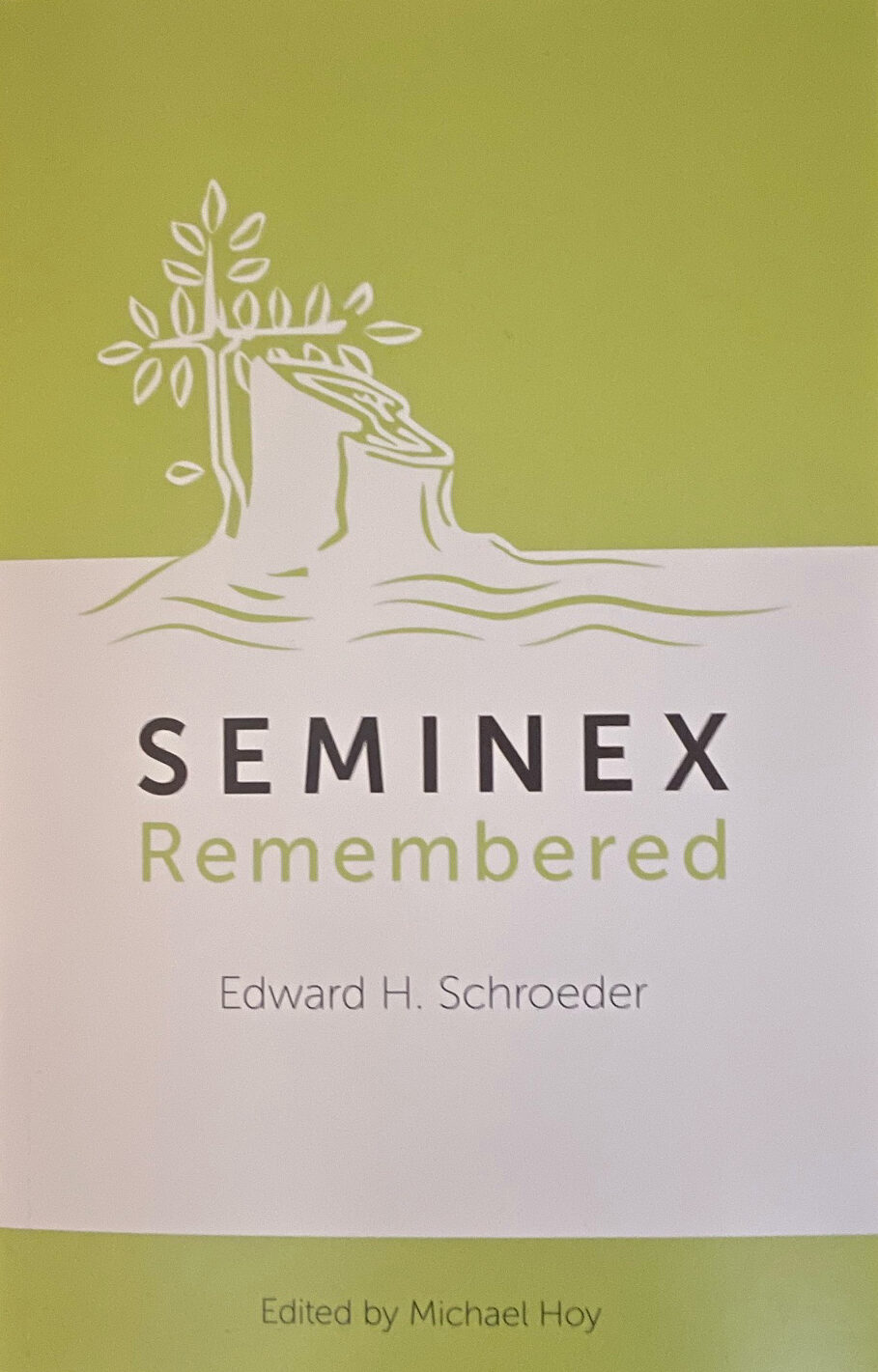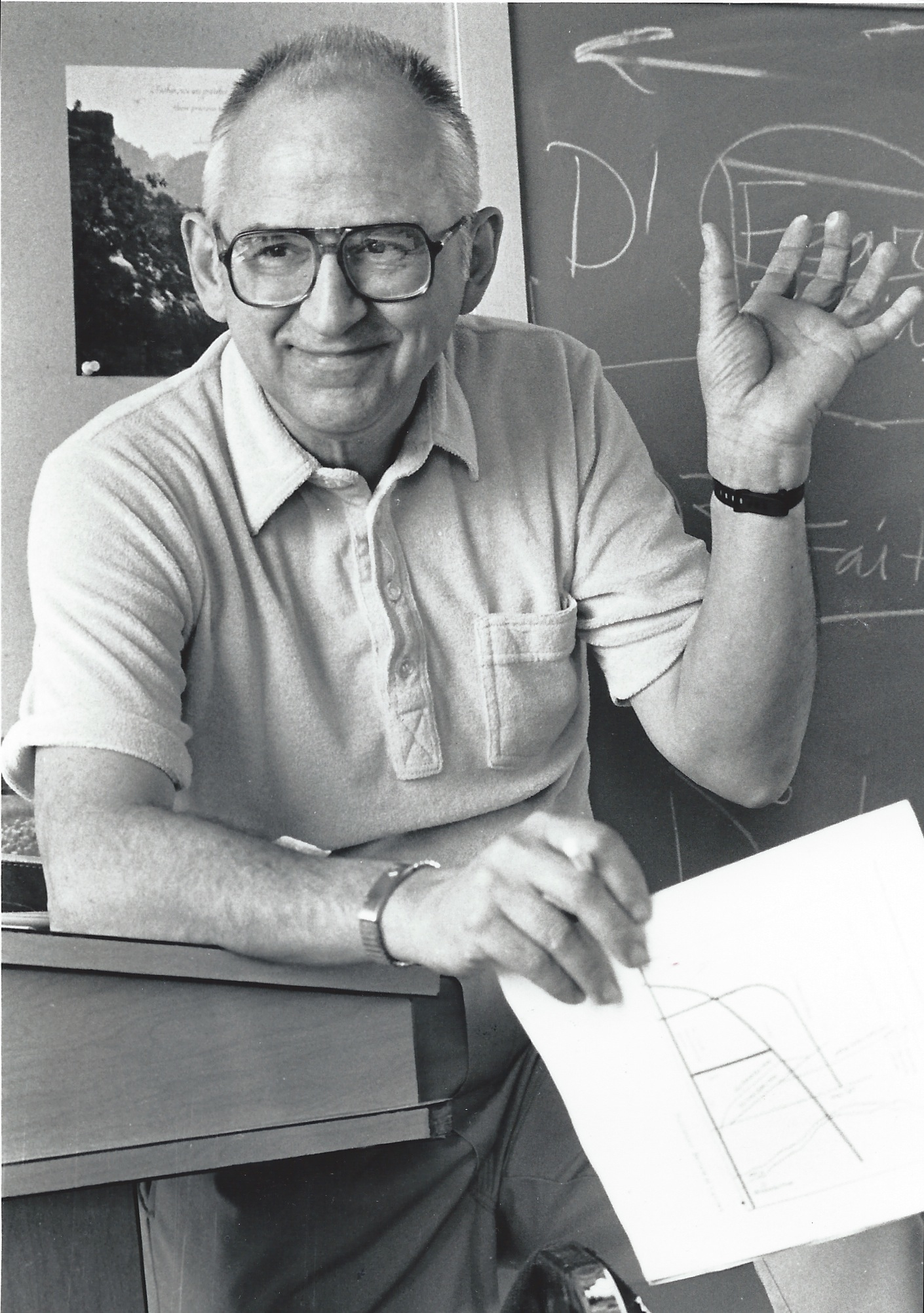Co-missioners,
We are nine days shy of the fiftieth anniversary of a momentous event in the recent history of U.S. Lutheranism—or even, one might argue, of American Christianity.

Seminex students in chapel, ca 1970s.
Christ Seminary Seminex Photo Subject files, box 6, folder 5 Students.
ELCA Archives image. http://www.elca.org/archives
The year was 1974. On the evening of January 20, bells began tolling on the campus of Concordia Seminary, St. Louis, the premier theological institution of the Lutheran Church—Missouri Synod. Students streamed to the seminary chapel. There they learned that the school’s Board of Control had just suspended the Rev. Dr. John H. Tietjen from his office as seminary president. A month later Seminex was born.
One can draw a fairly straight line from the sound of those bells to the present arrangement of Lutherans in America in two large if shrinking blocks. One leans left in matters cultural and political. The other leans right. Neither is willing to engage the other in respectful conversation. Neither is able to do this, perhaps.
This intractable separation afflicts every other denominational tradition in the country these days. No one knew it at the time, but the bells that tolled for Lutherans on January 20th ’74 were tolling for Baptists too. Or so we think.
We hope to explore this at some length in Thursday Theology as the current year goes by. The story of Seminex merits more attention than it will get in the standard channels of church communication and scholarly inquiry. What notice it does get there is likely to be scant. Some of it will be skewed. This is already the case with the less-than-professional article on Seminex in Wikipedia, that every-person’s go-to source for a first glimpse into most anything. To read it in its current state is to come away with two impressions. Missouri’s triumph over error is the first of these, “Missouri” being the old combatants’ shorthand for “Lutheran Church—Missouri Synod.” The second impression is of Seminex as the snake in the ELCA’s theological Eden, the insidious driver of that body’s unfolding lapse into rampant progressive heterodoxy.
Both these impressions need to be addressed before this year is out. So do others that float around out there. We will have younger readers particularly in mind as we take on this challenge. If born after 1980 they’ll know little of the Seminex story. This includes younger pastors that we at Crossings would love to infect with the theology that Seminex throbbed with. It shapes our work today. It invites joy in the Gospel of God at work for us in Jesus Christ. It’s worth the attention it will likely not have received in their seminary training. We would hate for anyone to be put off from exploring it by misinformation casually encountered along the way.
And there is this: if Crossings doesn’t tackle the job of rehearsing the story this year, no one will. Owing to our roots in a project conceived by Robert Bertram and Edward Schroeder, two of Seminex’s key theologians, we find ourselves today as de facto stewards of the school’s legacy as mediated through those two. Yes, a Seminex reunion is in the works for this coming April, and no, Crossings had nothing to do with organizing it. Still, once that event is over and those involved have all dispersed, there will be no ongoing reflection that we’re aware of unless we make it happen.
We have already taken some initial steps in that direction.
First:
A week or two before Christmas, Crossings published a booklet entitled Seminex Remembered. It comprises seven of the earliest Thursday Theology posts by Ed Schroeder. In these he gives a brief account of Seminex as he recalled it in 1998. This was fifteen years after the school closed in 1983 and almost a quarter of a century since that fateful tolling of the bells in January ’74. As it happens, Ed starts his telling six months earlier, at an LCMS convention held in New Orleans in the summer of 1973. Votes taken there would set the stage for a first dismissal or two of faculty members at Concordia, St. Louis in the fall of ‘73, and for the forcing of early retirement on a handful of older professors, among them a few of the school’s most brilliant lights. John Tietjen’s suspension soon followed.
Ed recounts this quickly and vividly. He then tells of the exile from Concordia in February, ’74; of the first months of Seminex’s operation in borrowed facilities; of how the school settled down for a time in a space of its own; of internal debates and challenges that teachers and students alike were obliged to face and endure, especially as enrollment begin to dwindle and donor-fatigue set in. Along the way he makes a steady, persuasive case for understanding what happened throughout the experience as a contention for the Gospel. Eventually he spills his grief over the decision to close the school after a mere nine years and disperse its remaining faculty to other Lutheran seminaries.
In telling all this, Ed is refreshingly candid about the limits of his perspective. He was not in the inner circle of Seminex decision-makers. As a faculty member, he certainly saw more than most students did. Any former students who dip into the booklet are almost certain to stumble across things they weren’t aware of at the time. Those new to the story will come away with an honest, bracing, and finally rueful account of an episode they’ll be glad to have learned about. And since Ed is the one telling the story, they’ll have picked up some good theology along the way.
Seminex Remembered is available as a gift from Crossings to anyone who asks. To place your order, use the Crossings website. We add that the booklet has been edited, annotated, and introduced by Mike Hoy whose prior work includes the editing of two books by Robert Bertram. It also comes with a Foreword by Jerry Burce in his role as current president of the Crossings board, and an Afterword by Kurt Hendel, one of Ed’s faculty colleagues at Seminex and, thereafter, a longtime professor of church history at the Lutheran School of Theology at Chicago.
Again our encouragement: order Seminex Remembered now.
+ + +
Second:
The next two editions of Table Talk, Crossings’ monthly Zoom forum for theological discussion, will focus on the Seminex story. Our Table Talk coordinators, Cathy Lessmann and Steve Albertin, have assembled an impressive panel of at least twenty-six speakers, all of whom were involved in Seminex as it unfolded. Most were students. One or two were faculty members. Others were children of faculty members. Of the students, a few went on to careers in academia or church publishing. One currently leads an ELCA seminary. Three served for a time as ELCA bishops. Most emerged along the way as highly esteemed pastors. As students, all of them were held in high regard by both their teachers and their peers.
It’s a big bunch, to say the least. Steve and Cathy have asked them to speak briefly (no longer than three minutes each) around four questions, two to be handled at the forthcoming session on January 23, the other two to be taken up in a second session on February 20.
The questions for January 23—
-
- What is your most significant memory of the “Seminex experience” and why?
- How has “the Seminex experience” affected you personally?
And on February 20—
-
- What do you think “the Seminex experience” was really about, and why?
- How has “the Seminex experience” affected the Church and your understanding of its mission?”
We feel safe in asserting that nothing like this will happen anywhere else this year in connection with Seminex’s anniversary. Anyone new to the story—anyone whose recollections have faded—will be treated to as broad and rich a review as one could wish for.
Here too we urge your participation. Both sessions will start at 1 p.m. Central Time, concluding at 2:30 p.m. If you’re new to Table Talk, see our website for information on how join the discussion, or else simply drop a note to Cathy Lessmann. She’ll make sure you get the Zoom link.
+ + +
Finally:
As we look ahead at 2024, we project a monthly series of Thursday Theology posts on Seminex-related topics. We’ll launch this already next week with some further recollections by Ed Schroeder, this time on the connection between Seminex and Crossings. Stay tuned.
Peace and Joy,
The Crossings Community (per Jerome Burce, Editor, Thursday Theology)
Thursday Theology: that the benefits of Christ be put to use
A publication of the Crossings Community





You must be logged in to post a comment.